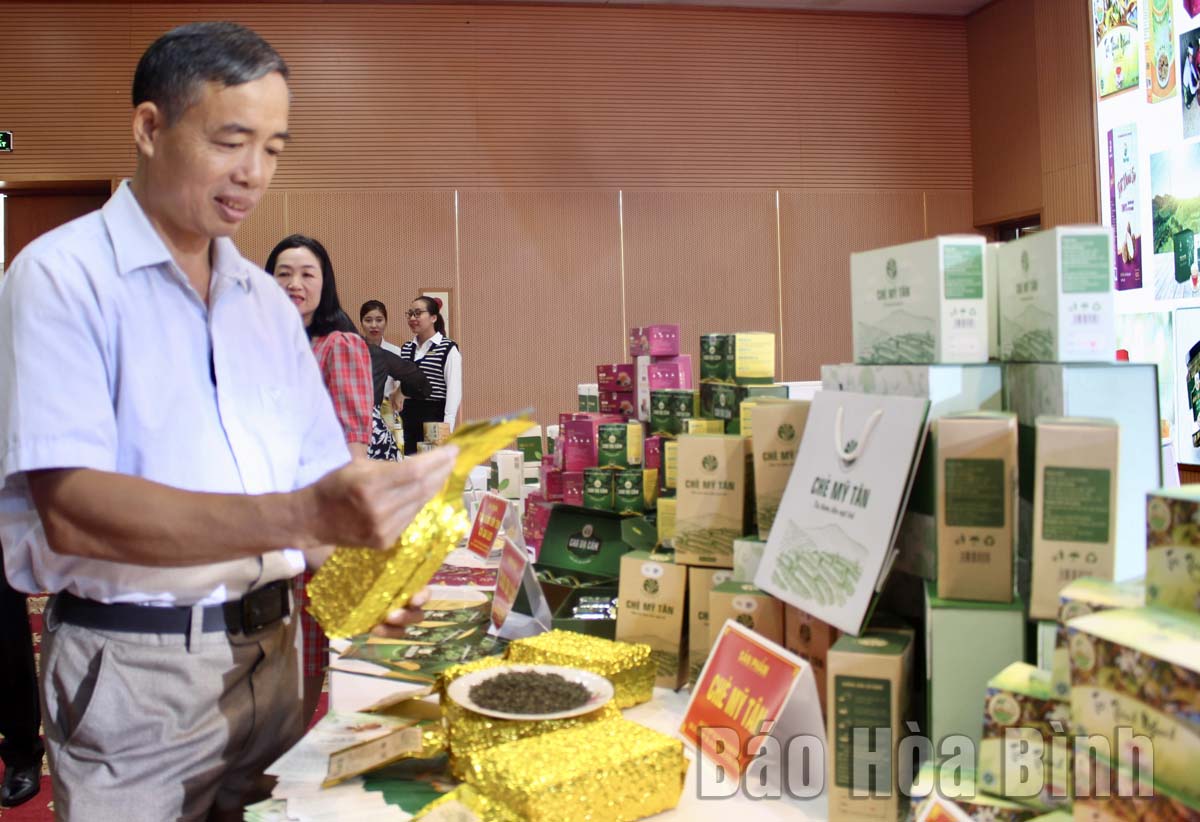
(HBO) - Since its establishment, My Tan Agriculture Cooperative in Cao Duong commune, Luong Son district, has always persistently pursued the goal of creating safe and environmentally friendly agricultural products. Dien pomelo, guava, and tea are three typical products of the cooperative that are cultivated in accordance with Vietnamese or global good agricultural practices (VietGAP, GlobalGAP), organic standards and the province’s One Commune One Product programme standards. The products are mainly sold at large supermarkets in Hanoi and Hai Phong cities and Quang Ninh province.

My Tan tea
products of My Tan Agriculture Cooperative in Cao Duong commune, Luong Son
district, are rated as three-star products of the province’s One Commune One
Product (OCOP) programme in 2022.
The My Tan Agriculture Cooperative was established in August 2018 to create a
linkage in the production and consumption of agricultural products. Since then,
members of the cooperative have changed their traditional farming practices in
line with VietGAP or organic standards that are friendly to the environment and
has higher values.
Currently, the cooperative has 86
hectares of pomelo and 138 hectares of guava in accordance with VietGAP,
GlobalGAP and organic standards. Thanks to favourable soil conditions and good
care, My Tan pomelos and guavas are highly appreciated for their quality such
as sweetness and fragrance. Pomelos and guavas of My Tan have been present in
large supermarkets such as Bac Tom and BigC and canteens of some enterprises
In 2022, My Tan tea was certified by the provincial People's Committee as a
three-star OCOP product. With a unique flavour, it is chosen by many customers
as a gift on holidays and Tet (Lunar New Year). Currently, the product is put
for sale in supermarkets in Thai Nguyen, Hanoi and Hai Phong. This year, the
cooperative has produced 26 tonnes of tea with prices ranging from 350,000 VND
(15 USD) to 370,000 VND per kilogramme on the occasion of Tet holidays.
Do Quoc Huong, Director of the My Tan
Agriculture Cooperative, said that the cooperative focuses on improving the
product’s quality and productivity to expand the consumption market and enhance
its value.
It is determined to maintain cultivation of Dien pomelo, guava and tea in line
with OCOP standards as well as enhance their rankings, he said, adding that
farming in accordance with OCOP standards helps double the products’ prices
compared to the conventional methods.
The cooperative has also stepped up promotional activities, putting products on
sale on e-commerce trading floors to explore long-term partners.
Its revenue was estimated to reach about 26 billion VND in 2022./.
According to data from the Hoa Binh Provincial Party Committee, the industrial production index for the first six months of 2025 is estimated to have increased by 20% compared to the same period last year. This marks the highest year-on-year growth rate for this period since 2020.
In the first six months of 2025, Hoa Binh province’s export turnover was estimated at 1.145 billion USD, marking an 18.11% increase compared to the same period in 2024. Import turnover was estimated at $ 804 million, a 17.15% increase, which helped the province maintain a positive trade balance.
The lives of the ethnic minority farmers in Tan Lac district have gradually improved thanks to the new directions in agricultural production. This is a testament to the collective strength fostered through the professional associations and groups implemented by various levels of the district’s Farmers’ Union.
With the motto the "product quality comes first,” after nearly one year of establishment and operation, Muong village’s Clean Food Agricultural and Commercial Cooperative, located in Cau Hamlet, Hung Son Commune (Kim Boi district), has launched reputable, high-quality agricultural products to the market that are well-received by consumers. The products such as Muong village’s pork sausage, salt-cured chicken, and salt-cured pork hocks have gradually carved out a place in the market and they are on the path to obtaining the OCOP certification.
In the past, the phrase "bumper harvest, rock-bottom prices" was a familiar refrain for Vietnamese farmers engaged in fragmented, small-scale agriculture. But today, a new spirit is emerging across rural areas of Hoa Binh province - one of collaboration, organisation, and collective economic models that provide a stable foundation for production.
Maintaining growing area codes and packing facility codes in accordance with regulations is a mandatory requirement for agricultural products to be eligible for export. Recently, the Department of Agriculture and Environment of Hoa Binh province has intensified technical supervision of designated farming areas and packing facilities to safeguard the "green passport" that enables its products to access international markets.



